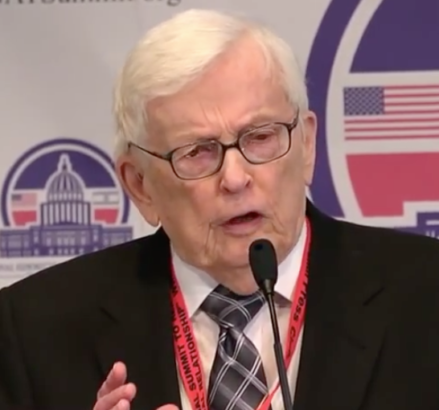Former Republican Congressman Paul Findley speaks at the National Summit to Reassess the US-Israel ‘Special Relationship,’ March 7, 2014 (video here).
The Republican Congressman from Illinois worked for human rights for Palestinians for almost half a century, penning the first exposé on the Israel lobby… (A documentary about his life is at the bottom of this post)
By Alison Weir
Former Congressman Paul Findley, a longtime advocate for Palestinian human rights, has passed away at the age of 98. Findley was a forefather of the movement for justice in Palestine, speaking and writing on the issue for almost half a century.
Findley was a Republican Congressman from Illinois when he began speaking out about Palestine in the 1970s. Before long, the Israel lobby targeted him, and after serving 22 years in Congress, he was pushed out in 1982.
Findley then wrote a groundbreaking book: They Dare to Speak Out: People and Institutions Confront Israel’s Lobby. He described in riveting detail how Israel partisans had similarly worked to push out other Americans who had spoken out about Palestine, from positions in Congress, the media, academia, and elsewhere. (A PDF is available here.)
He once wrote: “I marvel—and recoil—at the grip the government of Israel, a small nation of about five million people, maintains over America, a nation of nearly 300 million. After many years in politics, I am convinced that this is America’s greatest burden today.”
In the introduction to They Dare to Speak Out, Findley wrote:
“Much of the information provided here is volunteered by career government officials who want the public to be aware of how the lobby functions but insist that their own names be withheld. These requirements tell a lot about the sensitivity of the subject matter.”
Findley revealed that It had been extremely difficult to get the book published:
“Declining to represent me, New York literary agent Alexander Wylie forecast with prophetic vision that no major U.S. publisher would accept my book. He wrote, ‘It’s a sad state of affairs.’ Bruce Lee of William Morrow and Company called my manuscript ‘outstanding,’ but his company concluded that publishing it ‘would cause trouble in the house and outside’ and decided against ‘taking the heat.’ Robert Loomis of Random House called it an ‘important book’ but reported that the firm’s leadership decided the theme was ‘too sensitive.’ Twenty other publishers also said no.”
Eventually, a small company published the book, and for a brief time it was a Washington Post bestseller. Soon, however, the explosive book was largely buried. Today, even many Palestine activists haven’t heard of Paul Findley or his book – a testament to the degree to which information about the Israel lobby continues to be obscured from Americans’ knowledge.
Findley went on to write several more books, including Deliberate Deceptions: Facing the Facts About the U.S.–Israeli Relationship, and Silent No More: Confronting America’s False Images of Islam. Many of his reports and analyses were published in The Washington Report on Middle East Affairs.
Findley also cofounded the Council for the National Interest, a nonprofit organization in Washington DC that works to counter the Israel lobby and advocate for rational, moral U.S. Mideast policies. He was a founding board member of If Americans Knew, which works to inform Americans on the American connection to Israel-Palestine. He also served on the National Council of Americans for Middle East Understanding (AMEU), which has published a magazine on the issue since 1967.
Findley was also a strong advocate for the crew and family members of the USS Liberty, which had been lethally attacked by Israeli forces. He wrote a detailed report on the incident in which he stated:
“Israel’s war crimes against the USS Liberty and its crew on June 8, 1967—midway in the Six-Day War Israel launched against its Arab neighbors—provoked a startling, profound U.S. response, a cover-up that signaled the beginning of America’s 38 years of Israel-centric foreign policies. It marked a costly, radical turn for the worse that sent America’s prestige and credibility plunging and imposed on the American people ever-growing new burdens—even war—with no end in sight.”
Principled and courageous
Findley was known as a profoundly principled, committed, brave warrior against racism and injustice.
A Midwestern Presbyterian who grew up in Depression-era America and served in World War II, Findley was soft spoken, passionate about the need for justice, and quietly intelligent. His personal warmth and self-deprecating humor may have misled the Israel partisans who tried to bully him, only to have him produce a devastating exposé of their tactics.
Findley spoke out for Palestinians when most people were silent.
Others, since have also spoken out and been similarly targeted – including African American Democratic Congress members Cynthia McKinney and Gus Savage (see videos below).
Today some young Congress members are courageously daring to speak out again – and coming under the same vicious assaults.
Findley’s revelatory book helped to wake up many people about Palestine and the power of the Israel lobby, and his long fight for human rights inspired people around the world.
UPDATE:
Additional information and videos have been added to this posting, including an article about Findley that was published by his hometown newspaper in Jacksonville, Illinois: “Paul Findley: Congressman recalled as outspoken advocate for equality, community.” (This is also posted in full below)
Alison Weir is executive director of If Americans Knew, president of the Council for the National Interest, and author of Against Our Better Judgment: The Hidden History of How the U.S. Was Used to Create Israel.
Our operations are funded solely by generous individuals like you. Your contribution will help us continue shining a light on the Israel/Palestine situation and the U.S. connection.
DONATETrailer for documentary about Paul Findley:
Full documentary:
If Americans Knew video containing Paul Findley:
Paul Findley: Congressman recalled as outspoken advocate for equality, community

Although the effects of age had quieted the voice of longtime congressman Paul Findley over the past few years, his legacy remained far from silent.
The Jacksonville native, who rose to political power as a Republican member of the House of Representatives from 1961 to 1983, died Friday.
He was 98.
Findley was born June 23, 1921, and graduated from Jacksonville High School and Illinois College. After receiving his bachelor’s degree, he served in the Navy from 1943 to 1946, attaining the rank of lieutenant while stationed in the Pacific.
It was there he met his future wife, Lucille Gemme, while both were stationed on the island of Guam. She was one of the few enlisted women in the war effort and served as a flight nurse, helping to save the lives of wounded soldiers.
“They certainly fell in love during the war,” said Findley’s son, Craig. “… They were both lieutenants, but my mother was quick to note that she did outrank Dad.”
They returned to the United States and moved to Washington, D.C., where Findley started working as a journalist. He returned home to west-central Illinois and pursued his passion for writing, becoming president of the Pike Press in Pittsfield before an unsuccessful bid in 1952 for the Republican nomination for state Senate. His journalistic endeavors would continue throughout his life as he penned six books, largely about politics and Congress.
His political journey started with his election to the 87th Congress. Findley would be elected to the next 10 Congresses before his loss to Dick Durbin, now a senator.
Findley was a champion for farmers, serving on the Board for International Food and Agricultural Development from 1983 to 1994. More than that, however, his name became deeply attached to foreign affairs and civil rights. Findley established himself as a straight-forward speaker and champion for the underdog.
In April 1965, Findley chose Frank Mitchell of Springfield, then a 15-year-old student at Feitshans High School, as the first African-American page for the U.S. House of Representatives.
The congressman, who as a teenager wrote a letter to the editor denouncing a minstrel show and calling for a boycott, cajoled fellow Republican lawmakers to support the Civil Rights Bill.
“Republican leader Gerald Ford announced he would oppose the 1964 Civil Rights Bill, although he supported all the rest. That bothered me,” Findley recalled in a 2015 interview with the Journal-Courier. “I decided to send a letter to all House Republicans urging an affirmative vote. I should have told Ford what I was planning. The next year, I suggested to him that Republicans should take the lead by appointing the first black to a page assignment. Republicans were alerted about five page spots. Ford, of course, controlled them all. He liked the idea and later in the day asked me to recommend (someone from my district) for that historic position.”
In a 2014 column for the Journal-Courier, Findley reflected on the importance of racial harmony.
“Racial turmoil may not disappear completely in America until most of us take the racial challenge seriously,” he said. “Bad apples are present in both white and black races, but that reality should not deter interracial civility, harmony and friendship. Whites and blacks must begin to welcome each other into their churches, homes and, yes, families. We must acknowledge that the only real difference between races is in the pigmentation of skin. It is time for all of us to recognize that black and white are beautiful colors in the rainbow of humankind.
“Whites and black need to discover each other face-to-face. How about creating opportunities to sit down together and enjoy civil conversation over a favorite drink in your home? Is that really difficult to arrange?”
Findley was an early critic of the Vietnam War and one of the primary authors of the 1973 War Powers Act to limit a president’s authority to wage war. He was an advocate for engagement with the Arab world, particularly Palestine, and a fellowship program bearing his name allows 25 university undergraduate and graduate students a 10-week professional-, academic- and career-opportunity internship in Washington, D.C., each year. The program features a mix of Arab-U.S. relations professional involvement, career exploration and cultural encounters.
A founding member of the advisory board of the National Council on U.S.-Arab Relations, Findley in 2013 received the council’s first-ever Distinguished Public Service and Lifetime Achievement Award. He also co-founded The Council for the National Interest, which seeks to encourage and promote a U.S. foreign policy in the Middle East that is consistent with American values, protects U.S. national interests and contributes to a humane solution in the Arab-Israeli conflict.
The relationships he established included one with Khalaf al Habtoor of Dubai, a businessman Findley recalled as a “rare billionaire who invests his earnings in education, anti-poverty programs and peace efforts.” Findley brought Al Habtoor to Jacksonville for the first time several years ago and Illinois College archives bear his name — the Khalaf Al Habtoor Archives in IC’s Schewe Library. The college also maintains the Paul A. Findley Congressional Office Museum, where many of the late congressman’s artifacts, including many of his congressional papers, are stored.
“I had no dream ever that my papers, records, artifacts would receive such attention here at Illinois College,” Findley said. “I’m overwhelmed with what’s being done to preserve the records of what I attempted to do in Congress and do since.”
Illinois College President Barbara Farley said the Class of 1943 graduate was devoted to the success of Illinois College students and was a “mentor to many.” His service to Illinois College is a part of his legacy, alongside his service to his community and country.
“Paul Findley was a pillar of the Illinois College community,” she said, adding that he “will be greatly missed.”
Findley’s time in Congress lasted through seven presidents. One he recalled with fondness was Jimmy Carter. The congressman met Carter in 1977 and committee assignments often put him and the president together.
“Of the seven presidents with whom I served, he stood out as a remarkable human being. He was kindly, a good listener, always considerate, devoid of pretense and eager to cooperate,” Findley recalled. “He could be tough as steel. On two important but unpublicized occasions, he forced the Israeli prime minister to stop military operations in Lebanon that violated U.S. law. In Camp David diplomacy that produced a peace treaty between Egypt and Israel, he kept President Anwar Sadat of Egypt from leaving the scene in disgust over the intransigence of Israeli Prime Minister Menachem Begin, and on another occasion he secured an important concession from Begin that again kept negotiations alive. After Arab South Yemen became a part of my life in 1974, I urged Carter to reopen diplomatic relations with the local government. Carter told me, ‘I will see to it.’ And he did.”
Findley’s love of history, particular of Abraham Lincoln, was apparent throughout his time both in and out of Congress, He was a laureate of the Lincoln Academy and once remarked that he considered the transfer of the Abraham Lincoln Home in Springfield to the National Parks Service one of his greatest achievements as a congressman.
Findley brought his family to Washington with him so he could spend more time with them while serving in Congress and Craig Findley said his father was always present for school activities. Growing up around the Capitol, Craig Findley remembers spending time in his father’s office and exploring as a boy.
“In the old days, anyone could go to the Capitol and walk anywhere in any office,” he said. “So I’d often go downtown with friends and we went from the basement of the Capitol and one day we found a way to climb up on the rooftop and look over onto the Mall.”
Findley returned to his hometown after his defeat in the 1982 election. Andrew Findley said his grandfather had a deep connection to central Illinois, especially Jacksonville.
“He was actually born, honestly, on the kitchen table on Edgehill Lane, which is not more than a mile and a half from where he died and within a few blocks of where he spent most of his life after leaving Congress,” Andrew Findley said.
Many of Andrew Findley’s memories of his grandfather were from times they went out — and his grandfather was always talking to and learning about people. When his grandfather was home, he always had visitors, whether they were old friends or someone he had just met.
“It must have been a difficult thing in some ways — to lose a widely publicized election and then to move back to his hometown,” Andrew Findley said. “He once told me that the reason he did so was because that was the only choice he had. He could have (gone) anywhere in the world, to be honest with you. He chose to retire to Jacksonville because — he told me and he told my grandmother this, also — … they wanted to live in a community where they knew everyone and everyone knew them. He wanted to be able to know his neighbors, to say ‘hi’ to people on the streets. And, over the last 40 years, that’s precisely what he’s done.”
Craig Findley said, for all the work his father did for the people of Jacksonville, “he was repaid tenfold.”
A memorial service will be at 10:30 a.m. Wednesday at First Presbyterian Church, 870 W. College Ave. The family will meet friends from 4 to 7 p.m. Tuesday at the Paul Findley Congressional Office Museum in Whipple Hall on the Illinois College campus.





